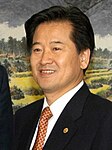The Liberty Korea Party (Korean: 자유한국당) was a conservative political party in South Korea that was described variously as right-wing, right-wing populist, or far-right. Until February 2017, it was known as the Saenuri Party, and before that as the Hannara Party from 1997 to 2012, both of which are still colloquially used to refer to the party. The party formerly held a plurality of seats in the 20th Assembly before its ruling status was transferred to the Democratic Party of Korea on 27 December 2016, following the creation of the splinter Bareun Party by former Saenuri members who distanced themselves from President Park Geun-hye in the 2016 South Korean political scandal.

The Democratic Labor Party was a progressive and nationalist political party in South Korea. It was founded in January 2000, in the effort to create a political wing for the Korean Confederation of Trade Unions which was considered more left-wing and more independent of the two union federations in South Korea. Its party president was Kwon Young-gil, Kang Gi-gap, and Lee Jung-hee. In December 2011, the party merged into the Unified Progressive Party.

The Yeollin Uri Party, generally abbreviated to Uri Party, was the ruling social-liberal political party in South Korea from 2003 to 2007. A liberal party, it was created to support then-President Roh Moo-hyun. Chung Sye Kyun was the last leader of the party and twice served as its chairman. In 2007 the party merged the United New Democratic Party to form the Democratic Party. The current-day descendant of the party is the Democratic Party of Korea, but progressives in the party have become members of the Justice Party.
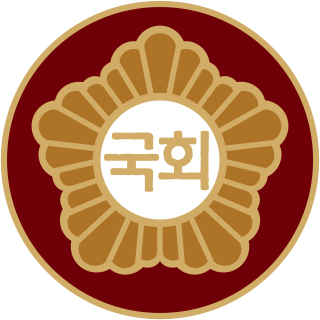
The National Assembly of the Republic of Korea is the unicameral national legislature of South Korea. Elections to the National Assembly are held every four years. The latest legislative elections were held on 10 April 2024. The current National Assembly held its first meeting, and also began its current four year term, on 30 May 2024. The current Speaker was elected 5 June 2024. The National Assembly has 300 seats, with 253 constituency seats and 47 proportional representation seats; 30 of the PR seats are assigned an additional member system, while 17 PR seats use the parallel voting method.

Elections in South Korea are held on a national level to select the President and the National Assembly. Local elections are held every four years to elect governors, metropolitan mayors, municipal mayors, and provincial and municipal legislatures.

Chung Dong-young is a politician and was the United New Democratic Party nominee for President of South Korea in 2007.

Park Geun-hye is a South Korean politician who served as the 11th president of South Korea from 2013 to 2017. Park was the first woman to be elected president of South Korea, and also the first female president popularly elected as head of state in East Asia. She was also the first South Korean president to be born after the founding of South Korea. Her father, Park Chung Hee, was president from 1963 to 1979, serving five consecutive terms after he seized power in 1961.
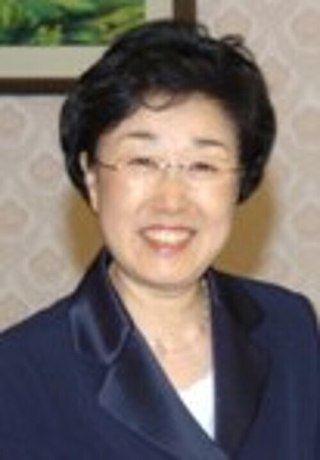
Han Myeong-sook is a South Korean politician who served as the prime minister of South Korea from April 2006 to March 2007. She is South Korea's first female prime minister. She was from the United New Democratic Party (UNDP) as a member of the Korean National Assembly (representative) for Ilsan-gab, and is a graduate of Ewha Womans University in Seoul with a degree in French literature. She resigned as prime minister on March 7, 2007, and declared her presidential candidacy. But she did not succeed in the nominations. In 2008 she ran for congress, but was not elected. However, in January 2012 she was elected leader of the main oppositional Democratic United Party (DUP) before the April legislative elections and became a congresswoman. But the liberals did not manage to defeat the ruling Saenuri Party and Han stepped down as party leader in April 2012. In August 2015, Han was convicted of receiving illegal donations and sentenced to two years in prison. Han has maintained her innocence. In 2021, she was granted special amnesty by the government and her constitutional rights were restored.
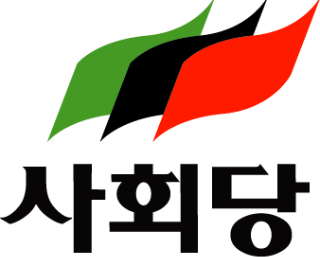
The Socialist Party was a minor left-wing political party in South Korea, founded in 1998. It advocated an ideology of socialism, social republicanism, peace and environmentalism.

Chung Un-chan is a South Korean politician who served as the 40th prime minister of South Korea from 2009 to 2010. He was a professor of Seoul National University from 1978 to 2009, serving as the president of the university from July 2002 to July 2006. From 2018 to 2020, Chung also served as the 22nd commissioner of the Korea Baseball Organization.

The following outline is provided as an overview of and topical guide to North Korea:

Legislative elections were held in South Korea on 13 April 2000.

Roh Moo-hyun was a South Korean politician and lawyer who served as the ninth president of South Korea between 2003 and 2008.
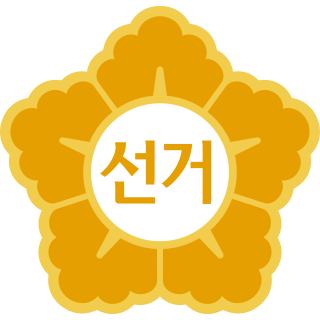
The National Election Commission is an independent constitutional institution in South Korea, established to manage free and fair elections, national referendums and other administrative affairs concerning political parties and funds. The agency was established in accordance with Article 114 of the Constitution of South Korea. The NEC has equal status as highest constitutional institution as National Assembly, the Executive Ministries, the Supreme Court and the Constitutional Court. This highly independent status of NEC reflects national will to overcome past histories such as election rigging of South Korea in 1960.
The Hannara Party was a political party in South Korea. While former chairman Lee Tae Hee argued that the party succeeded Hwanin and Hwanung, the Liberty Korea Party argued that Hannara had stolen the Saenuri Party's older name to confuse conservative voters. However, the South Korean National Party Commission (중앙선관위) supported the legality of the name.

Early presidential elections were held in South Korea on 9 May 2017 following the impeachment and removal of Park Geun-hye. The elections were conducted in a single round, on a first-past-the-post basis, and had originally been scheduled for 20 December 2017. However, they were brought forward after the decision of the Constitutional Court on 10 March 2017 to uphold the National Assembly's impeachment of Park. Following procedures set out in the Constitution of South Korea, Prime Minister Hwang Kyo-ahn succeeded Park as the acting president. After Park was removed from office by the Constitutional Court's ruling, acting president Hwang announced he would not run for a term in his own right.

Hwang Kyo-ahn is a South Korean politician and prosecutor who served as acting president of South Korea from 9 December 2016 to 10 May 2017 and the prime minister of South Korea from 18 June 2015 to 11 May 2017.

The Basic Income Party is a single-issue political party in South Korea advocating for a universal basic income (UBI). For the 2024 Parliamentary election, the Basic Income Party formed a coalition with the Open Democratic Party and the Social Democratic Party, called the New Progressive Alliance.
The following lists events in the year 2022 in South Korea.


